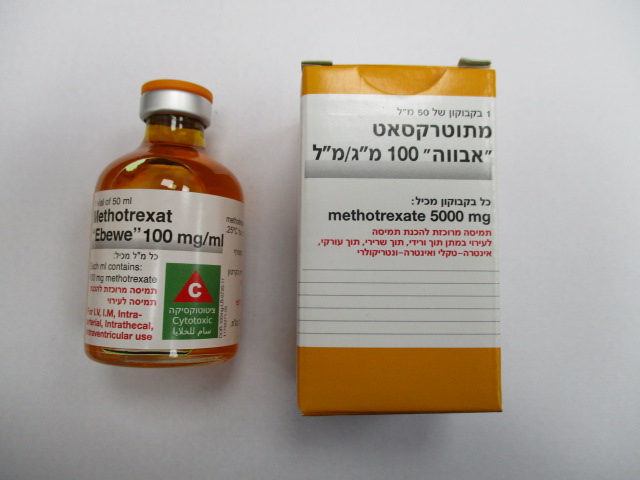Quest for the right Drug

מתוטרקסאט " אבווה " 100 מ"ג/מ"ל METHOTREXAT "EBEWE" 100 MG/ML (METHOTREXATE)
תרופה במרשם
תרופה בסל
נרקוטיקה
ציטוטוקסיקה
צורת מתן:
תוך-שרירי, תוך-עורקי, תוך-ורידי, תוך חדרי, תוך-שדרתי : I.M, INTRA-ARTERIAL, I.V, INTRA VENTRICULAR, INTRATHECAL
צורת מינון:
תרכיז להכנת תמיסה לאינפוזיה : CONCENTRATE FOR SOLUTION FOR INFUSION
עלון לרופא
מינוניםPosology התוויות
Indications תופעות לוואי
Adverse reactions התוויות נגד
Contraindications אינטראקציות
Interactions מינון יתר
Overdose הריון/הנקה
Pregnancy & Lactation אוכלוסיות מיוחדות
Special populations תכונות פרמקולוגיות
Pharmacological properties מידע רוקחי
Pharmaceutical particulars אזהרת שימוש
Special Warning עלון לרופא
Physicians Leaflet
Pregnancy & Lactation : הריון/הנקה
4.6 Fertility, pregnancy and lactation Women of child-bearing age/contraception in women Women must not get pregnant during methotrexate therapy. Effective contraception must be used during treatment with methotrexate and at least 6 months after discontinuation (see section 4.4). Prior to initiating therapy, women of childbearing potential must be informed of the risk of malformations associated with methotrexate and any existing pregnancy must be ruled out with certainty by taking appropriate measures, e.g. a pregnancy test. During treatment pregnancy tests should be repeated as clinically required (e.g. after any gap of contraception). Female patients of child-bearing age must be counselled regarding pregnancy prevention and planning. Couples should be given extensive counselling on the severe risks to the foetus if a pregnancy occurs during the treatment. Contraception in men It is not known if methotrexate is accumulated in semen. Methotrexate has been shown to be genotoxic in animal studies, such that the risk of genotoxic effects on sperm cells cannot be completely ruled out. Limited clinical evidence does not indicate an increased risk of malformations or miscarriage following paternal exposure to low-dose methotrexate (less than 30 mg/week). For higher doses, there is insufficient data to estimate the risks of malformations or miscarriage following paternal exposure. As precautionary measures, sexually active male patients or their female partners are recommended to use reliable contraception during treatment of the male patient and for at least 6 months after discontinuation of methotrexate. Men should not donate semen during therapy or for 6 months following discontinuation of methotrexate. Pregnancy: Methotrexate is contraindicated during pregnancy for non-oncological indications (see section 4.3). If pregnancy occurs during treatment with methotrexate and up to six months thereafter, medical advice should be given regarding the risk of harmful effects on the child associated with treatment and ultrasound examinations should be performed to confirm normal foetal development. In animal studies, methotrexate has shown reproductive toxicity, especially during the first trimester (see section 5.3). Methotrexate has been shown to be teratogenic to humans; it has been reported to cause foetal death, miscarriages and/or congenital abnormalities (e.g. craniofacial, cardiovascular, central nervous system and extremity-related). Methotrexate is a powerful human teratogen, with an increased risk of spontaneous abortions, intrauterine growth restriction and congenital malformations in case of exposure during pregnancy. • Spontaneous abortions have been reported in 42.5% of pregnant women exposed to low-dose methotrexate treatment (less than 30 mg/week). This compares to a reported rate of abortions of 22.5% in disease-matched patients treated with medicinal products other than methotrexate. • Serious birth defects occurred in 6.6% of live births in women exposed to low-dose methotrexate treatment (less than 30 mg/week) during pregnancy. This compared to approximately 4% of live births in disease-matched patients treated with medicinal products other than methotrexate. Insufficient data is available for methotrexate doses during pregnancy higher than 30 mg/week, but higher rates of spontaneous abortions and congenital malformations are expected. When methotrexate was discontinued prior to conception, normal pregnancies have been reported. When used in oncological indications, methotrexate should not be administered during pregnancy, in particular during the first trimester of pregnancy. In each individual case the benefit of treatment must be weighed up against the potential risk to the foetus. If the medicinal product is used during pregnancy or if the patient becomes pregnant while taking methotrexate, the patient should be informed of the potential risk to the foetus. Breast-feeding As methotrexate passes into breast milk and may cause toxicity in nursing infants, therapy is contraindicated during the breast-feeding period (see section 4.3). If therapy during the breast- feeding period should become necessary, breast-feeding must be stopped before starting treatment. Fertility Methotrexate affects spermatogenesis and oogenesis and may decrease fertility. In humans, methotrexate has been reported to cause oligospermia, dysmenorrhoea and amenorrhoea. These effects appear to be reversible after discontinuation of therapy in most cases. In oncologic indications, women who are planning to become pregnant are advised to consult a genetic counselling centre, if possible, prior to therapy and men should seek advice about the possibility of sperm preservation before starting therapy as methotrexate can be genotoxic at higher doses (see section 4.4).

שימוש לפי פנקס קופ''ח כללית 1994
Leukemias, non-hodgkin's lymphomas, breast, head and lung carcinoma, choriocarcinoma, osteogenic sarcoma. Severe psoriasis, rheumatoid arthritis unresponsive to conventional therapy, mycosis fungoides
תאריך הכללה מקורי בסל
01/01/1995
הגבלות
תרופה מוגבלת לשימוש בבתי חולים או אשפוז יום
מידע נוסף
